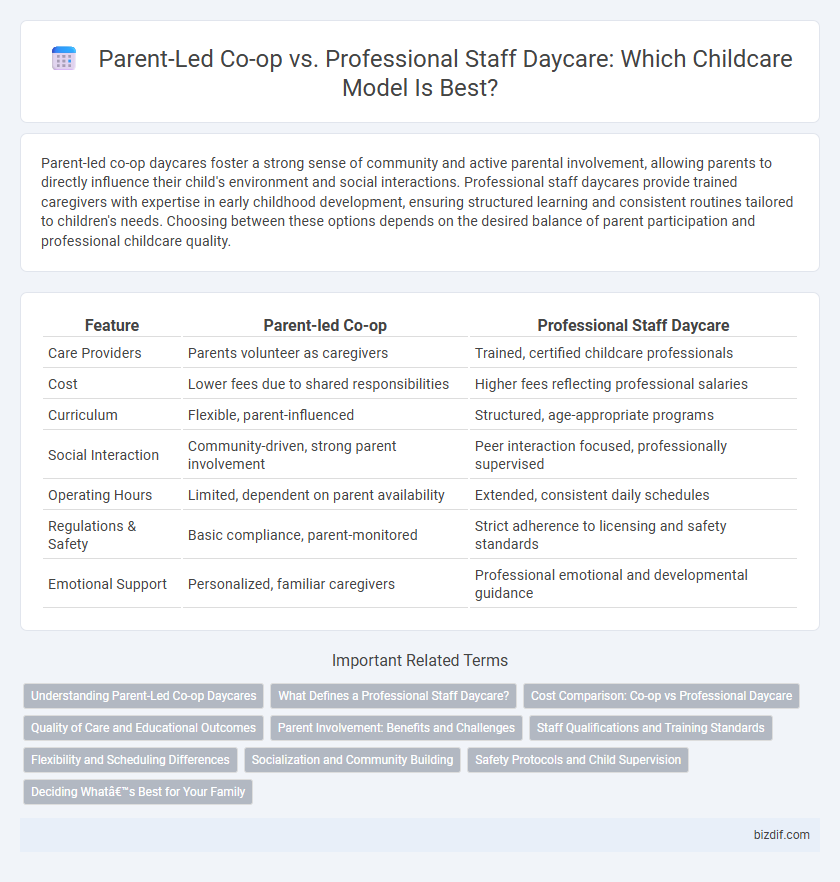Parent-led co-op daycares foster a strong sense of community and active parental involvement, allowing parents to directly influence their child's environment and social interactions. Professional staff daycares provide trained caregivers with expertise in early childhood development, ensuring structured learning and consistent routines tailored to children's needs. Choosing between these options depends on the desired balance of parent participation and professional childcare quality.
Table of Comparison
| Feature | Parent-led Co-op | Professional Staff Daycare |
|---|---|---|
| Care Providers | Parents volunteer as caregivers | Trained, certified childcare professionals |
| Cost | Lower fees due to shared responsibilities | Higher fees reflecting professional salaries |
| Curriculum | Flexible, parent-influenced | Structured, age-appropriate programs |
| Social Interaction | Community-driven, strong parent involvement | Peer interaction focused, professionally supervised |
| Operating Hours | Limited, dependent on parent availability | Extended, consistent daily schedules |
| Regulations & Safety | Basic compliance, parent-monitored | Strict adherence to licensing and safety standards |
| Emotional Support | Personalized, familiar caregivers | Professional emotional and developmental guidance |
Understanding Parent-Led Co-op Daycares
Parent-led co-op daycares provide a unique childcare model where parents actively participate in daily operations, fostering a strong community and personalized care for children. These co-ops often reduce costs by sharing responsibilities among families, promoting collaborative decision-making and direct involvement in curriculum and activities. Understanding the dynamics of parent-led co-ops helps families evaluate the benefits of shared caregiving roles versus professional staff-managed daycare centers.
What Defines a Professional Staff Daycare?
A professional staff daycare is defined by its employment of trained and certified early childhood educators who follow established curricula and licensing regulations to ensure a safe and supportive learning environment. These centers often implement standardized developmental assessments, maintain higher staff-to-child ratios, and provide consistent care backed by professional expertise in child development and safety protocols. Emphasis on regulatory compliance, structured programming, and ongoing staff training distinguishes professional staff daycares from parent-led co-ops.
Cost Comparison: Co-op vs Professional Daycare
Parent-led co-op daycares typically offer significantly lower costs, averaging 30-50% less than professional staff daycare centers due to shared responsibilities and reduced staffing expenses. Professional daycare centers, while more expensive, provide certified caregivers, structured programs, and regulated environments, often costing $1,000 to $2,000 per month depending on location. Families prioritizing budget may prefer co-ops, but those seeking expert care may invest more in professional services.
Quality of Care and Educational Outcomes
Parent-led co-ops often provide personalized attention and foster strong community bonds, enhancing emotional support for children. Professional staff daycares typically offer structured curricula guided by trained educators, resulting in higher consistency in educational outcomes and developmental milestones. Both models impact quality of care differently, with co-ops emphasizing family involvement and professional centers focusing on evidence-based teaching practices.
Parent Involvement: Benefits and Challenges
Parent-led co-op daycares offer increased parent involvement, fostering stronger community bonds and personalized care tailored to each child's needs. This hands-on approach enhances communication and trust but can also present challenges such as scheduling conflicts and varying levels of childcare expertise among parents. In contrast, professional staff daycares provide consistent care from trained caregivers, ensuring standardized early childhood education while limiting direct parental participation.
Staff Qualifications and Training Standards
Parent-led co-ops typically rely on volunteer parents with varied experience, often lacking formal childcare qualifications, which can impact consistency in care quality. Professional staff daycare centers employ trained early childhood educators certified in child development, safety, and first aid, ensuring adherence to rigorous training standards. These qualifications contribute to structured learning environments and adherence to state licensing requirements, providing greater assurance of child safety and developmental support.
Flexibility and Scheduling Differences
Parent-led co-op daycares offer unparalleled scheduling flexibility, allowing families to coordinate care hours based on shared availability, often accommodating irregular or part-time needs. In contrast, professional staff daycares operate on fixed schedules with set hours, providing consistency but less adaptability to individual family timetables. This fundamental difference impacts parental involvement, with co-ops requiring active participation that directly influences daily routines, while professional centers maintain structured operations managed entirely by staff.
Socialization and Community Building
Parent-led co-ops promote deep community ties as families actively participate in daily activities, fostering strong social connections and mutual support among children and parents. Professional staff daycares offer structured socialization guided by experienced educators, enhancing children's developmental milestones through planned interactions and skill-building exercises. Both models contribute uniquely to social growth, with co-ops emphasizing collaborative community engagement and professional daycares focusing on expert-led social development.
Safety Protocols and Child Supervision
Parent-led co-op daycares emphasize direct parental involvement in safety protocols and child supervision, fostering a community-driven environment with personalized attention. Professional staff daycares implement standardized safety measures and child supervision practices, often guided by licensing requirements and trained caregivers. Both models prioritize child safety, but professional daycares typically offer more consistent protocols due to regulatory oversight and specialized training.
Deciding What’s Best for Your Family
Parent-led co-op daycares offer a collaborative environment where parents actively participate in caregiving and decision-making, fostering close community ties and personalized attention. Professional staff daycares provide trained educators with structured curricula and consistent routines, ensuring early childhood development guided by expertise. Families should evaluate their availability, childcare philosophy, and children's needs to determine the best fit between hands-on involvement and professional care quality.
Parent-led Co-op vs Professional Staff Daycare Infographic

 bizdif.com
bizdif.com